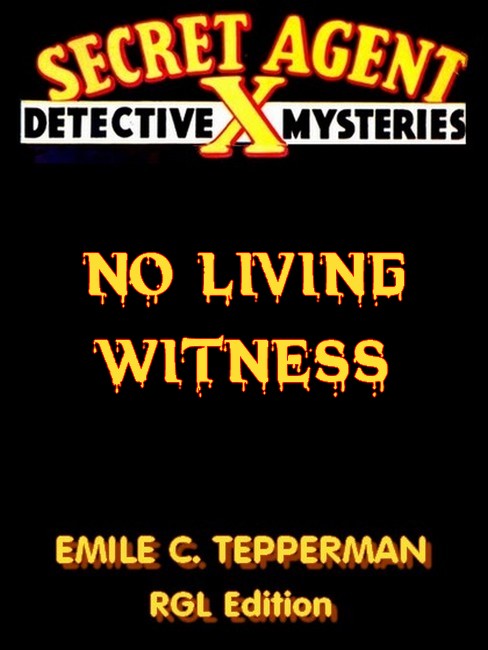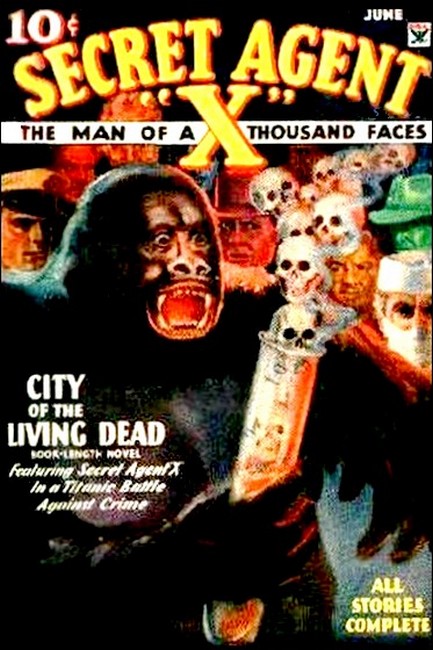
RGL e-Book Cover 2017©

RGL e-Book Cover 2017©

"Secret Agent 'X', June 1934, with "No Living Witness"
CRONIN jabbed his automatic in the man's stomach. The street, close to the water front, was dimly lit, deserted at night. Cronin's thick upper lip curled back mercilessly from discolored teeth.
"Stand still, guy. Don't raise your hands—just keep 'em where they are. Only don't make no funny moves, see?" He accompanied the admonition with a jab of the gun.
The victim was short, lean, and hard-featured. He evidently knew all about what a Colt can do to your insides if it's fired with the muzzle against your stomach. For he stopped perfectly still.
"If this is a holdup, you can have my dough. There's a ten dollar bill in my pants pocket."
"That's all I need," said Cronin. "Turn around."
The other turned, very carefully.
Cronin dug his hand into the man's pocket and dragged out the ten dollar bill, keeping the gun handy. He pocketed the bill, and suddenly his big hamlike arm encircled the little man from behind. He almost lifted him off his feet, and whispered in his ear, "I'm gonna knock you off, fella. Jake Cronin never leaves a living witness!"
The lean man squirmed, his hands clawing at the implacable arm about his neck. He tried to talk, but only a hoarse cackle gurgled out of his larynx.
Cronin's eyes glittered with killer's lust. He gloated, his lips close to the other's ear. "In case it makes you feel better, you ain't bein' rubbed out by any ordinary stickup. I'm the guy that pulled the Associated Jewelers job. That was a fifty grand haul. I just gotta have some spending money till the fence comes through with the dough for the swag."
The little fellow's face was purpling. He raised his heels in the air and drummed frantically at Cronin's shins. The sudden pain of the kicking heels drew an oath from the killer's lips. His arm tightened viciously. There was a ghastly crunching snap, and the little man ceased struggling. Cronin expelled his breath in a wheeze and dropped the inert body. It sprawled slackly on the pavement, the head tilted back at a gruesome angle.
The man was dead, all right. Cronin knew a broken neck when he saw one. Stooping, he started to go through the dead man's pockets. There was an interesting bulge under the vest But he was interrupted. Hard heels turned the far corner of the block, and he recognized the figure that passed under the street lamp. It was Detective Sergeant Pell.
Cronin cursed and melted into the doorway from which he had ambushed his victim. He felt his way through a black hallway, out into a back yard, over a fence and into an alley that led to the street beyond. As he emerged, he heard the blast of a police whistle. He grinned. That would be Pell, finding the body. Well, let him find it. They'd have to chalk up another murder to the unknown "Strangler's" account.
He strode swiftly away. A few blocks west he pulled the brim of his hat down over his eyes and entered a drug store. He bought a couple of packages of cigarettes, changed the ten dollar bill, and went into a phone booth. He dialed 211 and, when he got the long distance operator, he asked for a Chicago number. He got his connection, and a thin, rasping voice said, "Hello."
"This is—you know who," said Cronin, "callin' from New York."
"Gott!" said the voice. "Not Cro—"
"Shut up, you fool! You want to advertise it? It's bad enough I had to call you up. I was sick and tired of hiding out in that stinking boarding house room for five days. And no dough. When I gave you them sparklers, you promised to send me the cash as soon as you got back to Chi. Well, where is it?"
The voice shrilled despairingly. "Gott! Don't yell like that! I told you it might take me a couple of days to raise the money. That's why you held out two of the stones. You were going to pawn them, no?"
"Yes, and all the hock shops were wised up. I couldn't take a chance. If the cops caught on I was in New York, they'd figure me sure for that job. I'm supposed to be up in the mountains. I had to go out and get me some spending money on the q. t. tonight. So well where's the dough?"
The operator broke in. "Your time is up, deposit ninety cents for one minute more, sir."
Cronin thumbed three quarters, a dime and a nickel into the slots, and heard the other saying, "I raised twenty grand for that stuff this morning, and sent it with a guy named Gadwin. He's flying to New York—started early this morning. He should be there by now. Hurry up back and you'll maybe meet him."
"You sure you gave this guy Gadwin my right address, Dutchy?"
"Yes, yes. The right address he's got written down, with that phony name you're using."
"Okay," said Cronin. "I hope you ain't stringin' me, Dutchy. If you are—"
He hung up and strode out, keeping his hat brim low.
WITH the change of his ten dollar bill, he stepped into a lunch wagon and downed a plate of ham and eggs, two cups of coffee, and a cut of apple pie. He bought a newspaper and a fifteen-cent cigar, and strolled back to his rooming house.
Two-thirty-one Ellery Street, where he was temporarily stopping under the name of Jonas, was one of a row of bedraggled, crumbling four-story houses not far from the water front. Each one sported an eight-step stoop and a "furnished room" sign.
With his usual caution, he surveyed the street from the doorway of the corner store, and seeing that it was clear, walked swiftly to number two-thirty-one and ascended the stoop. He stepped into the dark hallway and stopped, motionless, his hand arrested in mid-air toward the shoulder clip where his automatic rested.
The powerful beam of a flashlight caught him full in the eyes. A moment later the hall light was switched on, the flashlight off, and his blinking eyes discerned Detective Sergeant Pell, covering him with a very steady thirty-eight.
"W-what's the big idea?" he mumbled.
Sergeant Pell was grim, the bleakness of his face denying the levity of his words. "Well, look who's here! If it ain't Jake Cronin in the flesh! And here I was thinking you were far away in the mountains!" While he talked, he frisked him deftly, and took the automatic.
"How'd you know I was here?" Cronin asked, dry-mouthed.
"Just an accident, Jake, just an accident. I wasn't looking for you. But now I know you're in town, I'm beginning to get ideas about that Associated Jewelers holdup, Monday, where the girl cashier was killed. Looks just like it might be one of your jobs. Let's go up to your room and kind of glance it over."
Cronin felt a thick sensation in his chest as he led the way upstairs with Pell's gun an inch from his spine. The two diamonds he had held out were pasted to the bottom of the bureau drawer in his room. A good place to hide them from the landlady or a casual visitor, but they would never escape Pell's practiced search.
"How—how did you find this joint?" he demanded again, over his shoulder.
"It's funny about that," said Pell. "I wasn't looking for you at all. I was looking for a bird named Jonas. You see, I ran into a guy with a broken neck down by the water front. He had a wallet pinned under his vest. In the wallet was twenty thousand berries in big bills, and a card with a name written on it—Jonas, two-thirty-one Ellery Street. So I moseyed over, looking for Jonas, and who comes walking in behind me but Jake Cronin!"
Cronin stopped short on the staircase, his face gray with the realization of what he had done. He turned quickly, his arm coming backward in a short arc. His elbow jabbed Pell in the mouth, and the detective was thrown against the wall. Cronin faced him snarling. His right fist, balled into a vicious weapon of hard knuckles, was coming up in a smashing uppercut, when Pell's gun began to roar. Three times it kicked as he pulled the trigger. The slugs caught Cronin in the chest, and he toppled down the steps with a frightful cry that was drowned by the reverberations of the gunshots in the narrow hallway. He was dead when he hit the landing.